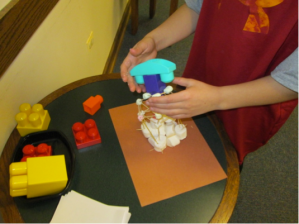A bit ago, Michelle discussed the advocacy piece of the tech programming puzzle. Now it’s time to take a look at another part: support.
Let’s acknowledge right off the bat that for many of us, incorporating STEM elements into our programming efforts can feel awkward and forced. Maybe you feel resentful at being asked to do something that you don’t feel equipped for, or something that you don’t think fits in with the rest of your library’s programming portfolio. If it’s different from your natural programming inclinations, it can feel like being asked to do storytime with one hand tied behind your back. In Mandarin. Or maybe you’re eager to try new things, but don’t know where to start and are doing this all alone. Having that spark but nothing to fuel it can be really isolating too.
Exploring concepts of science, technology, engineering, and math somewhere in our program offerings is no longer optional, and that means that some of us are being pushed out of our comfort zones. But, we’re all in the same boat. And let’s be honest: two important things that we need when we’re being pushed out of our comfort zones or adrift are people we can vent to and people who can cheerlead us into a better place.
Finding the people who can do this for you is one of the first steps into successfully attempting STEM programs, and I’m going to suggest that you look for people that will allow you to do both. These are the people with the right mix of pragmatism and optimism to acknowledge the difficulties and work to find ways to overcome them. Support folks like this might be in your department, in your library, in your local networking groups, and they’re certainly online. (Hint: you’ve found some of them here.)
The point is that they’re [we’re] out there. We’re in this together and we’re in this for the long haul. In libraries, the way we do things may be in constant flux, but the reasons why we do them never change. We work for our communities, with our communities, to connect them with resources and help them explore and learn from the world around them, whether it’s in fictional worlds, or in understanding the water cycle, or in teaching a robotic ball to do a dance.
Knowing that you’re not doing it alone will help in a few different ways. Finding your people will
- connect you with new ideas, new ways of doing things, and new products and services.
- give you peers to be accountable to, which will keep you moving forward.
- let you see that not everything works for everyone, and give you a chance to learn from others’ experiences.
- reduce the feelings of isolation and shouting into the void that come with trying something new when your footing it a little shaky.
- be fun. Really.
The Robot Test Kitchen came together last year as a result of a grant project. We’re thrilled to be helping others embrace technology programming in their own ways, but the truth is that some of us might not be doing nearly as much as we are doing if we lacked the support we’ve found in each other, and in others in our online and local communities. Everyone can do this. It’s just a matter of taking the first step. Reaching out and finding your people is a great first step. And let us know if you’re stumped! We’re your people too.

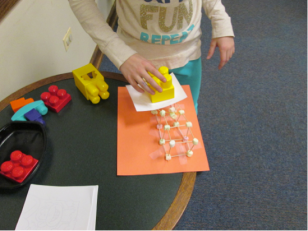 We’re thrilled today to feature our first guest submission for our $10 Tuesday feature! Jennifer Lee is a children’s librarian at the Thomas Ford Memorial Library outside of Chicago. She tells us about her recent program: Engineering Towers
We’re thrilled today to feature our first guest submission for our $10 Tuesday feature! Jennifer Lee is a children’s librarian at the Thomas Ford Memorial Library outside of Chicago. She tells us about her recent program: Engineering Towers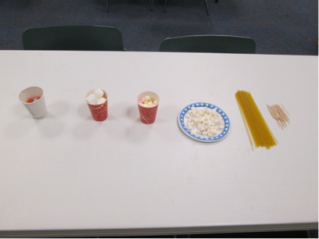 Toothpick, Spaghetti, Jelly (Gum Drops), Marshmallow (in different sizes), Construction Paper (for base), Tapes, Smaller papers (to test strength)
Toothpick, Spaghetti, Jelly (Gum Drops), Marshmallow (in different sizes), Construction Paper (for base), Tapes, Smaller papers (to test strength)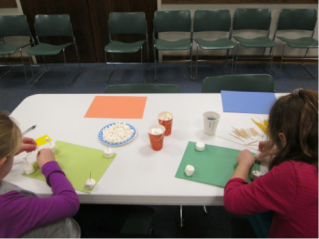 I had the Engineering tower program during weekday after school hour. When children arrived for the program, I basically explained what materials are prepared for them to use to build the tower. I asked the children if they had done similar projects before, and some children said they had in school. It was good to hear that they came for similar projects they had already experienced.
I had the Engineering tower program during weekday after school hour. When children arrived for the program, I basically explained what materials are prepared for them to use to build the tower. I asked the children if they had done similar projects before, and some children said they had in school. It was good to hear that they came for similar projects they had already experienced.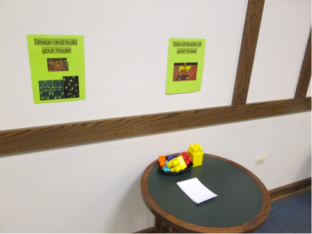 I also explained that there is a strength testing station to test the strength of towers. I informed them that they can build a tower in groups or individually. They all chose to build their own tower individually. After they finished building first tower, some of children brought their work to the strength testing station. Children were happy to see their towers stay strong after the strength test. Some children asked me if I am going to have the same program in the future, and it was good to know they had fun! After the program, I displayed their work in our department for the children to come back and look at their work, and other children to look at the wonderful works.
I also explained that there is a strength testing station to test the strength of towers. I informed them that they can build a tower in groups or individually. They all chose to build their own tower individually. After they finished building first tower, some of children brought their work to the strength testing station. Children were happy to see their towers stay strong after the strength test. Some children asked me if I am going to have the same program in the future, and it was good to know they had fun! After the program, I displayed their work in our department for the children to come back and look at their work, and other children to look at the wonderful works.